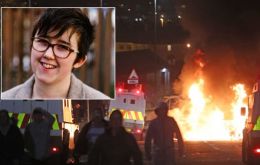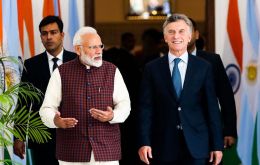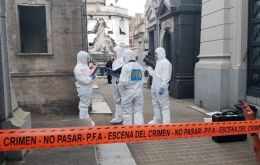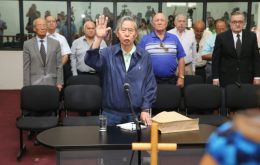MercoPress. South Atlantic News Agency
Tag: terrorism
-
Wednesday, August 14th 2019 - 08:49 UTC
FBI seeks to question Al-Qaeda suspect living in Brazil as legal resident

The US Federal Bureau of Investigation (FBI) is seeking to question an alleged Egyptian Al-Qaeda operative believed to be living in Brazil, and the South American country has pledged to cooperate with the United States in any way it can.
-
Tuesday, April 23rd 2019 - 09:05 UTC
Rift between Sir Lanka president and PM kept security forces on the black about the coming attacks

A rift between Sri Lanka's president and prime minister, which sparked a crisis last year, came under scrutiny on Monday a day after a series of deadly bomb blasts, with questions over how the government handled a recent warning of an attack.
-
Friday, April 19th 2019 - 09:26 UTC
Londonderry “terrorist incident”: young journalist shot dead

A journalist has been shot dead in Londonderry, Northern Ireland, in what police are treating as a “terrorist incident”. Dissident republicans are being blamed for killing 29-year-old Lyra McKee during rioting after police searches in Derry's Creggan area on Thursday night. Petrol bombs were also thrown at police Land Rovers.
-
Saturday, March 16th 2019 - 09:32 UTC
New Zealand terrorist planned to continue rampage; PM Ardern pledges to change gun laws

The main suspect in New Zealand's worst peacetime mass shooting intended to continue the rampage before he was caught by police, Prime Minister Jacinda Ardern said on Saturday. She also vowed to change New Zealand gun laws.
-
Tuesday, February 19th 2019 - 09:46 UTC
Macri on a state visit to India condemns terrorism and signs ten agreements

India and Argentina inked ten agreements including in defense, agriculture, space, pharmaceuticals, Antarctic cooperation, agriculture, IT and nuclear cooperation. Indian Prime Minister Narendra Modi and Argentine President Mauricio Macri, accompanied by a high-level official delegation and around 100 top industry representatives of Argentine companies held bilateral talks on Monday.
-
Thursday, November 15th 2018 - 08:43 UTC
Buenos Aires hit by two bomb attacks

One bomb went off at Buenos Aires' Recoleta cemetery and another was exploded in a contained setting after being found near the car of Federal Judge Claudio Bonadio Wednesday in separate incidents that bear a few points in common. For example, both artifacts were visibly home-made.
-
Friday, October 5th 2018 - 08:25 UTC
Fujimori pleads for his life: a return to prison means a “death sentence”

Peru's ex-president Alberto Fujimori said from his hospital bed on Thursday that a return to prison would be a “death sentence,” the day after a court revoked a pardon for crimes against humanity. Fujimori, 80, addressed a plea to Peru's President Martin Vizcarra and the country's judiciary in a video recorded at his bedside.
-
Thursday, October 4th 2018 - 12:14 UTC
Fujimori's pardon reversed, due back in jail goes to hospital instead

Former Peruvian President Alberto Fujimori's pardon was reversed by a court of law Wednesday, ruling that he must go back to prison. Instead, he was admitted into a hospital on health grounds.
-
Thursday, July 5th 2018 - 08:27 UTC
Two British citizens critically ill after exposure to nerve gas Novichok

Two British citizens are critically ill after they were exposed to Novichok, the same nerve agent that struck down a former Russian agent and his daughter in March, Britain’s top counter-terrorism officer said on Wednesday.
-
Tuesday, June 26th 2018 - 17:39 UTC
“Uniting the world against terrorism”: OP-ED on the United Nations conference on counter-terrorism

NEW YORK — Terrorism is a persistent and evolving global menace. No country is immune. Social media, encrypted communications and the dark web are being used to spread propaganda, radicalize new recruits and plan atrocities. The threat ranges from the crude tactics of lone actors to sophisticated coordinated attacks and the horrific prospect of terrorists using chemical, biological or radioactive weapons.
